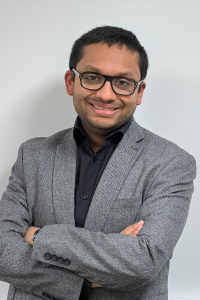Meet our Alumni: Atif Syed
News
Posted: 10/03/2022
Meet our Alumni: Atif Syed
Atif Syed PhD,
RAEng 1851 Enterprise Fellow 2018
When I graduated from my PhD, the conceptual groundwork for my company, Wootzano, had already been laid. The Commission’s support through the Enterprise Fellowship enabled me to scale-up the business around it. Now, it is truly bearing fruit.
My PhD was in Engineering and Electronics at the University of Edinburgh, and I had a particular focus on bionanotechnology; working on technologies at the nano-scale that were inspired by living systems.
Our first project was to design a synthetic form of human skin, that would act and, crucially, react as real human skin does. Initially, we considered using our skin for medical applications, drug testing and or patch delivery of dry vaccines for example, but then we discovered an interesting ulterior function.
Synthetic skin that can feed back on sensations it is experiencing, and that can sense pressure with a sensitivity thousands of times greater than human skin unlocked a useful application in the agricultural industry. This is where my company, Wootzano, comes in.
Globally, labour shortages in fruit-picking are common, and robotics has until recently been too expensive, and insufficiently sensitive to provide a solution. Wootzano combines its synthetic skin technology, better known as WootZkin, with cutting-edge robotics to provide accurate, data-driven and pressure sensitive machinery which can dexterously handle even the most complex of fruit such as grapes and snip them to weight. The artificially intelligent, fully integrated system, Avarai, is capable of handling even the softest of fruits like papayas, mangos, avocados, kiwis and melons, and machine learning techniques enable them to continually improve how they operate.
The Enterprise Fellowship was an essential boost for Wootzano in the early stages, not only providing crucial early-stage funding of £50,000 to kick-start the business, but also providing me with key mentoring and insights from business leaders that I continue to use to this day. The moral support that came with the Fellowship was also invaluable to me, as an engineer and entrepreneur with modest business experience, and with that I could focus on building out the company.
One of the motivating factors behind Wootzano was democratising access to robotics technology for businesses. Investment in robotics technology can be prohibitively expensive, and can take years to demonstrate value, so it was my aim to attempt to reduce those initial costs and provide access to future technologies.
Looking to the future, we continue to grow year on year. Over the coming years, we will be expanding to the US, and have recently secured a deal in excess of £300 million to provide thousands of Avarai systems across the UK. As our technology becomes more sophisticated, we aim to provide more than just a wider selection of fruits that can be handled, but also move into other sectors as well. We believe there is great future potential for robotics in the home, and we could even one day see a Wootzano robot, using its dextrous hands for mundane tasks such as cooking, cleaning and even ironing, leaving users with more time to focus on the things that matter to them.

